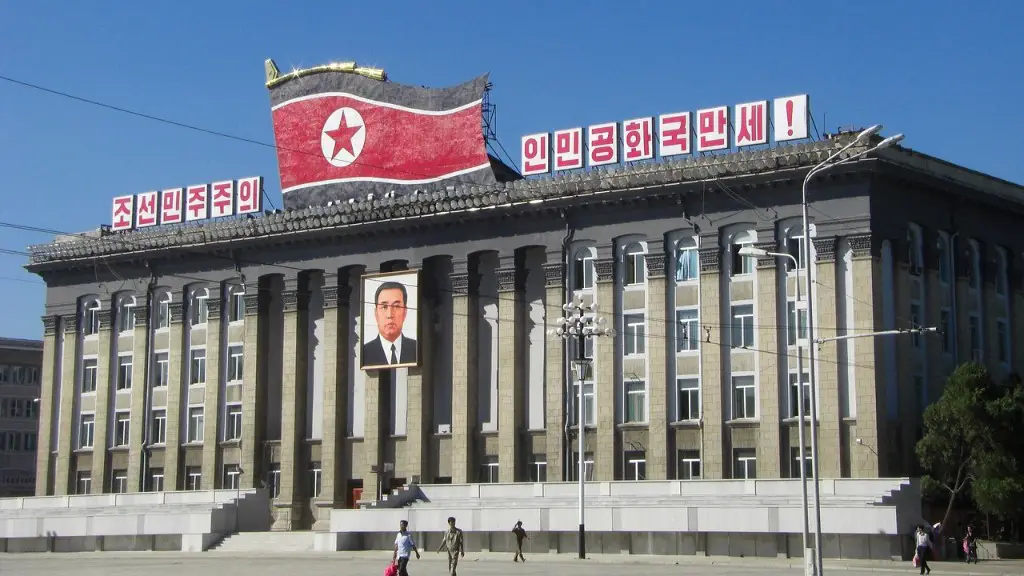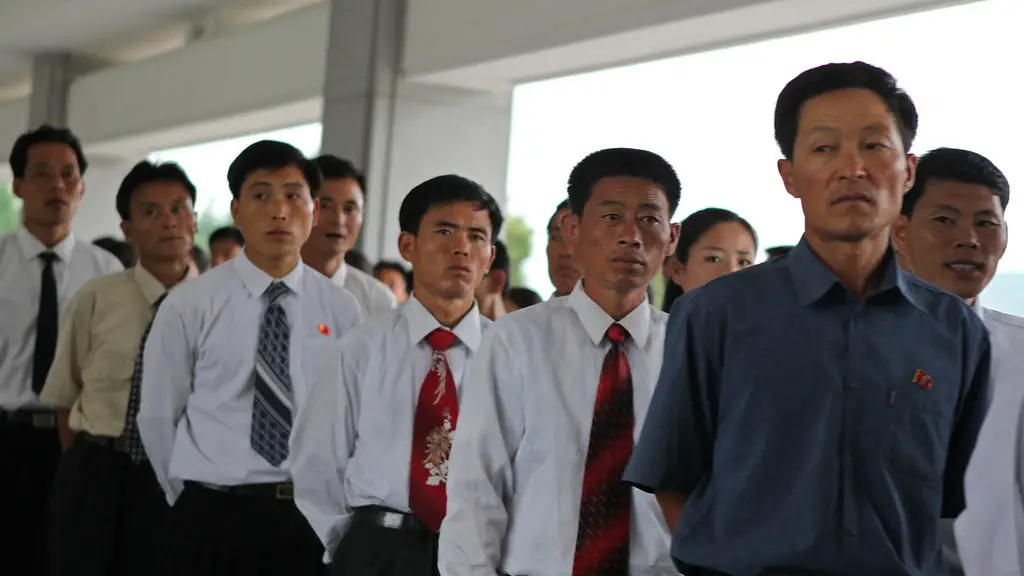North Korea is a single-party, totalitarian dictatorship situated in East Asia, bordered by China, South Korea and Russia. Its leader, Kim Jong-Un, is the head of the military-first policy and the face of the country’s propaganda. He is surrounded by an inner circle of advisors and loyalists, all of whom are essential to keeping the North Korean regime in power. North Korea’s ruling party, the Workers’ Party of Korea (WPK), is also deeply entrenched in the country’s politics. So, who are North Korea’s allies?
The relationship between North Korea and its main ally, China, is complex. China is the source of most of North Korea’s economic aid, which includes funding for diplomatic missions, energy, and military aid. China is also a major political backer, supporting North Korea in the UN Security Council and in other international fora. North Korea’s other major ally is Russia. The two countries have a history of cooperation, dating back to the Soviet Union’s support for the North Korean regime during the Korean War.
North Korea’s allies also extend beyond these two countries. North Korea has maintained close ties with several other countries, including India, Iran, Malaysia, and Syria. These countries have helped North Korea in various ways, such as providing vital financial and military support. In addition, North Korea has a number of allies through international organizations such as the Non-Aligned Movement, the Shanghai Cooperation Organization, and the Conference on Interaction and Confidence-Building Measures in Asia.
It is important to note that North Korea’s allies are not necessarily active allies. In many cases, they are simply countries that are willing to maintain a relationship with North Korea despite its rogue status. For example, China has recently cracked down on North Korean businesses seeking to take advantage of its economic sanctions, but has not cut off its diplomatic or economic ties to the country entirely. In addition, while Russia has lent its support to the North Korean regime, it has also taken an active role in supporting international efforts to contain the North Korean nuclear weapons program.
North Korea’s alliances are largely based on a shared interest in maintaining the existing balance of power in East Asia. As such, North Korea relies heavily on China and Russia for diplomatic cover and military aid. Likewise, China and Russia have both been reluctant to take any concrete steps to pressure North Korea and impose heavy sanctions, as they fear that doing so could destabilize the region.
Ultimately, the US has remained North Korea’s greatest adversary. The US has maintained a strong military presence in the region since the Korean War and has regularly imposed sanctions against the country. As a result, North Korea has had to find creative ways to develop its nuclear weapons program without the help of its allies. The recent diplomatic overtures between North Korea and the US suggest that the two countries may be willing to come to an agreement on the nuclear issue, but it remains to be seen if this will ultimately lead to a lasting peace.
Relationship With China
The relationship between North Korea and its ally China is critical. China is the source of most of North Korea’s economic aid and supplies more than half of the country’s foreign trade. China has also historically maintained strong diplomatic ties with North Korea, providing diplomatic cover in international forums. Although China has become increasingly critical of North Korea’s aggressive stance in recent years, it has nonetheless remained the country’s major backer and ally.
China is also the primary source of North Korea’s military aid. China has supplied North Korea with military equipment, such as tanks, munitions, and rockets. In addition, China has provided medical aid to North Korea, as well as engineering and technical assistance. China has also been instrumental in helping North Korea develop its nuclear weapons program, providing critical aid and technical knowledge.
Despite the shared interest of both China and North Korea in maintaining the current balance of power in East Asia, China has recently cracked down on North Korean businesses seeking to take advantage of its economic sanctions, but has not cut off its diplomatic or economic ties to the country entirely. Nonetheless, North Korea continues to rely heavily on its relationship with China for both economic and diplomatic support.
Relationships With Other Countries
North Korea has developed close ties with other countries in the region and beyond, notably, India, Iran, Malaysia, Syria, and the Central Asian nations of Uzbekistan, Kazakhstan, and Turkmenistan. These countries have provided North Korea with varying degrees of economic, diplomatic and military aid. For example, in the case of Iran, there has long been speculation that the two countries have a nuclear weapons agreement.
In addition, North Korea has also maintained strong ties with various international organizations. The Non-Aligned Movement (NAM) was founded in 1961 and is comprised of over 120 countries that are striving to achieve global peace and security. North Korea has been a member of the movement since its creation and uses it as a platform for political dialogue. The Shanghai Cooperation Organization (SCO) is a regional security organization which North Korea joined in 2003. North Korea also participates in the Conference on Interaction and Confidence-Building Measures in Asia, an organization that works to promote regional and international cooperation among Asian countries.
North Korea’s Nuclear Program
North Korea has pursued nuclear weapons for years, despite strong international opposition. In 2006, the country tested its first nuclear weapon and has since conducted five additional tests. North Korea’s nuclear weapons program has been largely funded by its ally China, who has provided critical economic and military aid, as well as technical and engineering knowledge. North Korea’s nuclear ambitions have also been aided by Iran, who has sent equipment and personnel to assist in its nuclear weapon development.
Despite the international community’s efforts to contain and denuclearize the Korean peninsula, North Korea is believed to possess between 15 to 60 nuclear warheads. U.S. intelligence suggests that North Korea is capable of building a nuclear weapon relatively quickly with the help of its help, leading to fear and uncertainty in the region.
Societal Impact of Allied Relations
The political and economic effects of North Korea’s relationship with its allies are felt among North Korean citizens. North Korea’s alliance with China and Russia has provided the country with financial and military support, keeping its economy afloat and its military strong. However, the effects of this relationship have not been uniformly positive. North Korea’s economic dependence on its allies has limited its ability to pursue independent economic policies, contributing to its impoverished state. In addition, the North Korean government has used its allies’ military support to prop up its own repressive policies.
North Korea’s relationships with its allies have also had a significant impact on its people. North Koreans are denied basic rights and freedoms, including freedom of expression, freedom of religion and freedom of peaceful assembly. Living conditions in North Korea are dire, with shortages of food, electricity and basic medical care. The UN estimates that over 10 million people in North Korea are in need of food assistance.
In addition, North Korea’s pursuit of a nuclear weapon has significantly strained its relationship with its allies, particularly China. China has been increasingly critical of North Korea’s aggressive stance and has worked with the US and other countries to impose economic sanctions on the country. In recent years, China has cracked down on North Korean businesses seeking to take advantage of its economic sanctions, but has not cut off its diplomatic or economic ties to the country entirely.
International Relations With North Korea
The international community has taken a hard stance on North Korea in recent years, in an attempt to contain and eliminate its nuclear weapon program. The US has implemented a number of economic sanctions against North Korea, including restrictions on its foreign investments, trade, and access to the global financial system. In addition, the US has also sent a strong show of military presence in the region, including military drills with South Korea, Japan, and other US allies.
In response to the international pressure, North Korea has continued to test its nuclear capabilities and has threatened to launch ballistic missiles at US territories and allies. North Korea has also threatened its allies with military action if they join the US-led international effort to contain its nuclear program. In response, China and Russia have both increased diplomatic outreach to North Korea, in the hope of persuading it to abandon its nuclear weapons program.
The US and North Korea have taken small steps towards dialogue in recent months, with President Trump meeting with North Korean leader Kim Jong-Un in Singapore and vowing to end the long-standing hostility between the two countries. It remains to be seen if this diplomatic push will ultimately lead to a lasting peace with North Korea.
US/South Korea Relations
The US and South Korea have a long and complex relationship that has been largely shaped by the Korean War and the recent nuclear crisis with North Korea. The two countries are committed to the defense and security of South Korea and have agreed to a number of measures to enhance their mutual cooperation, including military exercises and joint patrols in the Yellow Sea.
The US and South Korea are also committed to joint efforts against North Korea’s nuclear program and to improving regional security in East Asia. The two countries have joined forces to pressure North Korea to abandon its nuclear ambitions, and have both adopted a policy of “strategic patience” in the face of Pyongyang’s provocations. In addition, the US and South Korea have agreed to maintain a strong deterrent in the region and to cooperate on non-proliferation, missile defense and other key issues.
In recent months, the two countries have increased their joint efforts to contain the North Korean threat and have made progress on a range of issues, such as denuclearization, economic sanctions, and nuclear inspections. The US and South Korea continue to work together to bring stability and peace to the Korean peninsula, and to develop a long-term solution to the nuclear crisis.
Chinese-Korean Relations
China and North Korea have had a long and complex relationship, dating back to the Korean War. China is North Korea’s closest ally and main source of economic aid, providing the country with funds, energy, and military assistance. China also provides diplomatic cover for North Korea in international forums and has supported the North Korean regime’s policies and actions.
In recent years, China has become increasingly critical of North Korea’s aggressive stance and has worked with the US and other countries to implement economic sanctions on the country. China has also taken steps to limit North Korean businesses seeking to take advantage of its economic sanctions, but has not cut off its diplomatic ties to the country entirely. However, China remains the country’s major backer and ally.
Overall, Chinese-Korean relations remain complex and difficult to predict. China is committed to maintaining the balance of power in East Asia, but is concerned about North Korea’s nuclear ambitions and provocative behavior. It will be interesting to see how China and North Korea’s relationship evolves in the coming years.





